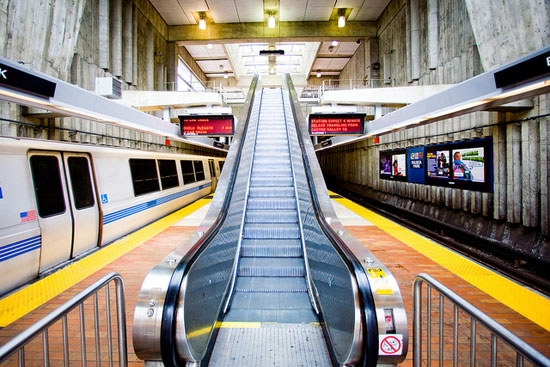
Though the dust is far from settled in the elections from Tuesday, some results will have a noted impact on transit in the Bay Area and the state. We'll have more coverage of the election results on smart growth in a future installment
San Francisco Proposition G
San Francisco voters overwhelmingly approved Proposition G, stripping the City Charter of the clause guaranteeing Muni operators the second highest salary and benefits package of any transit operator in the nation. The final vote was 64 percent for, 36 percent against. The Transport Workers Union (TWU) 250-A, the union that represents Muni operators, will now have to negotiate wages and benefits with the San Francisco Municipal Transportation Agency (SFMTA) through collective bargaining, a maneuver Prop G supporters hoped would compel the union to ditch some of its work rules deemed to be inefficient and outdated.
While the SFMTA declined to discuss its bargaining strategies before it sits down with TWU to negotiate a new contract to replace the one that expires on June 30, 2011, SFMTA CEO Nat Ford released a statement about the results.
"Proposition G gives the San Francisco Municipal Transportation Agency more flexibility to improve the work we do for San Francisco residents, visitors and the business community," said Ford. "It will allow us to be more creative in our efforts to improve service and expand our programs for our customers, while at the same time respecting the hard but vital work of our operators and the other employee units covered by the proposition. We look forward to working cooperatively with the unions."
According to the SFMTA, negotiations with TWU will likely begin shortly in the hopes they are able to negotiate a new contract before next summer and avoid an impasse. Representatives for the TWU did not return repeated requests for comment.
BART Elections
At BART, 20-year incumbent James Fang easily beat back challenges from two insurgents and received 49 percent of the vote. Bert Hill and Brian Larkin finished behind with 26 percent and 25 percent of the vote, respectively. Fang told Streetsblog he won because the public in his district was impressed with BART's 96 percent on-time performance and the many expansions he has helped shepherd during his tenure, including the San Francisco Airport and Oakland Airport connections, eBART and Warm Springs.
"I think the voters of San Francisco understand and appreciate the hard work that has made BART the number one transit agency in the Bay Area, if not the nation," said Fang. He also said the vote contradicted the argument made by his opponents that he was too focused on extensions to the detriment of the core system. Noting BART's $1.5 billion seismic retrofit and $3.5 billion car replacement programs, Fang said, "people who say we're not spending on the core system are frankly wrong."
In the next breath, he said one of the campaign discussions that resonated most powerfully with voters was the idea of resurrecting BART to the Beach, a subterranean extension from the Civic Center station to the Outer Richmond District under Geary Boulevard. Fang said BART had initially planned to build such an extension and had revisited the idea several times over the years, but had never delivered service to a large segment of taxpayers who had been paying BART sales tax for decades.
Fang said he was convening a committee of the board to push for the extension and said it would be a priority for him in the coming years. He argued the latent ridership for such an extension would easily make it worth the high price tag, which he estimated to be at least $8-10 billion.
"There's an old saying at BART," said Fang, "It's quicker to get from Richmond City to downtown San Francisco than it is to get from the Richmond District to downtown San Francisco."
In the other hotly contested BART election, long-time bicycle and transit advocate Robert Raburn upset incumbent Carole Ward Allen, receiving 46 percent of the vote. Ward Allen got 35 percent, followed by Monique Rivera, who received 17 percent.
Raburn said the result was a referendum on the Oakland Airport Connector (OAC) and the role of the BART Police in the killing of Oscar Grant nearly two years ago on the Fruitvale Station platform. Both the OAC and the Oscar Grant shooting thrust Ward Allen into the spotlight, given her pivotal role in pushing for the connector and her role in reforming oversight of the BART Police.
Raburn said there wasn't much hope of stopping the OAC now, but he hoped to prevent the agency from spending money on other projects he deemed "wasteful."
"I've long wanted to see BART provide better service and instead I've watched them deteriorate to spend money they don't have," he said. "We can turn BART around by building passenger appeal, providing better service, restoring the jobs that were eliminated when they worked. Let's stop balancing the budget on the backs of passengers."
Among Raburn's ideas for augmenting ridership were efforts to increase access to BART stations, notably by coordinating better with private shuttle services and funding BART shuttles around stations. In Alameda, where Raburn campaigned on a platform of better connections to the island with shuttles, he said BART could dramatically increase its ridership if they made it more convenient to get to the stations without having to drive.
He also stressed the need for better and safer pedestrian and bicycle connectivity to BART stations throughout the system, something he worked on as an advocate with the East Bay Bicycle Coalition.
On oversight of BART police, Raburn said he would pick up the work that Ward Allen started, of particular significance given the sentencing of former BART police officer Johannes Mehserle on Friday and any civil unrest that might result.
San Francisco District 10 and BART
One of the more interesting election questions that remains is how the results of the supervisor race in San Francisco's District 10 will impact the make-up of the BART board of directors. Currently, Lynette Sweet, who represents BART's District 7, is trailing Tony Kelly by 119 votes. Because of the massive field of candidates in the district, Kelly only has 13 percent of the vote and Sweet 12 percent, with 50 percent needed to win. Because of the nature of San Francisco's ranked choice voting, the outcome could take several weeks. As political consultant David Latterman said in The Bay Citizen today, "Ten is a clusterfuck."
If Sweet were to win the election for supervisor, her seat would be filled by a person chosen by James Fang, who, as president of the board, has the power to appoint a replacement to an outgoing board director. Though little can be said about who Fang would select if the situation were to occur and how that would change the votes on the board, the politics of the selection process will likely be fascinating. At a minimum, if Sweet were to leave and with Ward Allen's departure, the BART board theoretically could have only one woman and one minority representative, hardly reflective of the make-up of BART's ridership.
Proposition 22
California voters across the state affirmed their commitment to isolate local funding for municipal services from the Legislature and the Governor during budget season by passing Proposition 22, which guarantees that local or regional sales tax revenues dedicated to police, fire, libraries, transit and other municipal services cannot be shifted to pay down deficits in the state's general fund. If the proposition makes it through court challenges, it could restore nearly $2 billion dollars per year that lawmakers and Governor Schwarzenneger had diverted to the general fund the past few years.
Jeff Wagner, a representative from the California Transit Association, a lobbying group representing transit operators across the state and a significant supporter of Prop 22, said the results demonstrated the public's resolve for preserving quality of life and mobility funding that make communities livable. On the transit side, Wagner said the vote should ensure that at least in FY 2011-12 transit operators would receive a share of the state diesel tax, which should top $400 million, coupled with restoration of the $1.4 billion yearly from the Transportation Development Act (TDA), a 1/4 cent county sales tax for transportation funds established in 1971.
"We've got constitutional protections that ensure that transit revenues are spent on transit going forward," said Wagner. "The passage of this not only preserves the funding already on the books, but it reduces" the risk of transit funding raids.
"We definitely have some protections against the kinds of yearly shell games that have been going on with the budget and the diversions of transit funding," he added.
Wagner said despite the positive news, the CTA was prepared to continue its fight to preserve transit funding and he wouldn't rule out legislative maneuvering to change the funding schemes for transit, akin to the gas tax swap earlier this year. On the other hand, he was optimistic that the majority vote budget requirement in Proposition 25 would make it slightly easier to get more funding for transit.
"There is a sense of accountability by having majority budget vote," he said. "Future budgets will probably be more reflective of the majority party and in some ways that is beneficial for transit. The fact of the matter is, most of the key legislators we've been dealing with on addressing the transit funding crisis have been Democrats."




